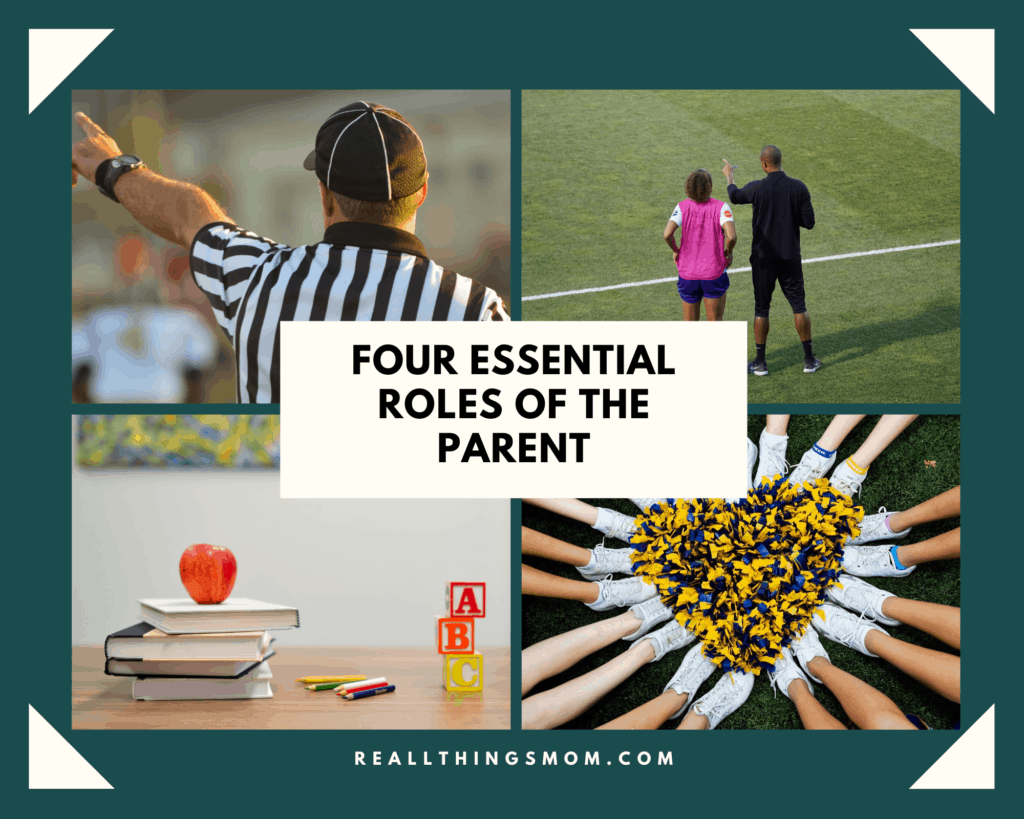
There are four essential roles parents need to fulfill–well, four that we’re going to discuss today. I have four children. Sometimes, I feel like all I do is referee. And sometimes, it’s not just between my children, but between my husband and my children.
The year that we adopted our daughter was the same year our oldest son became a teenager. Everyone was adjusting to the addition of a child from a traumatic start. Add to that, a strong-willed teenager flooded with hormones and all sorts of emotions that basically only manifested as anger and well, we needed more than a referee in our house!
My son and my husband are so much alike; not in every single way, but certainly in enough ways to butt heads every day. Imagine the irony of trying to prove our love and security to a broken toddler when every day was a battlefield in our home.
I wish I had known about Dr. Kathy Koch then! She encourages parents to think of four roles: Teacher, Coach, Referee, and Cheerleader. Often, if you are in the referee stage more often than you wish, it’s because the other three roles are coming up short.
So, if you’re at the end of your rope…and feeling like the glue of the family (you) is coming unglued, here are five things that may help.
Five Steps to Spending Less Time as Referees and More Time as Parents:
- Teach Your Child Anger Management and Conflict Resolution Skills–
Dr. Kathy Koch explains that parents fill the roll of teacher first. This is not news to most moms, right? But have you thought about teaching your child some conflict resolution techniques? Instead of telling your child when to apologize, or saying, “Don’t lose your temper,” help your child come up with some solutions. “What would help you calm down?”
For my son, his solutions changed often. One day, he needed the freedom to go for a walk, or a bike ride. The next day, he needed a punching bag. When he was younger, he had a pillow with a little face on it that he beat his fists on. Teaching your child to breathe and count to ten is often a good solution. Whatever it is, work with your child to figure this out before a conflict arises.
- Coach Your Child—
This is similar to teaching, but usually the timing is different. Think of how a basketball coach teaches the skills and rules of the game at practice, but helps the team step-by-step during the game. When there is a conflict, coach your child along the way. For example, one night, my son and my husband had very different opinions and my son said, “You were a real jerk last night.” Um…no.
I stepped in and said, “Time out! You will be able to resolve this much more quickly if you try saying, ‘I felt ______ when you ______’.” He went with it! And the conversation remained much calmer than usual. This works for younger children too and it allows them to consider their feelings in the situation.
- Referee—
Yes, you do have to referee sometimes, but this could give you more perspective: imagine a basketball game between two teams of third-grade boys who had not been taught anything about basketball and had no coaches. You and I both know that the referee would be working overtime! This is what happens in the home as well. If the teaching and coaching are in place, the referee does not have to work as hard.
- Cheer your child on—
Of course, every child needs encouragement. Even the most confident people need a cheerleader once in awhile. Can you imagine how discouraging it can be for a child who feels like all he does is make mistakes? I realized with our oldest son that he felt like the only time he ever heard from us was when we were teaching, coaching, or refereeing. He needed us to cheer him on. Not by saying, “I know you can do it,” but instead, pointing out when he did do it. He felt like every time he tried to do things better, it was overshadowed by the things he did wrong. It was pretty true and I needed to really do some work of my own on that.
- Don’t Choose Sides—
As far as I know, Dr. Koch doesn’t say anything about this, (because I have only heard her speak on this, but haven’t read her book yet!) but I think this is important. I have heard countless adults say things like, “I don’t think I would have remembered what my siblings and I fought about as much as the injustices that happened when my parents decided who was at fault and who was not.”
This rings especially true for me too! I remember every single time there was an injustice when my parents tried to decipher who was at fault (and guessed wrong), but I definitely don’t remember every single fight with my siblings. Some parents decide that the oldest child should know better so it’s her fault. Some base their decisions on past performance (we all know the kid who is usually at fault) and assume. Be careful! Making the wrong decision about who is at fault can be detrimental to your relationship.
Moms—we can do anything that we need to in order to survive for a time. Implementing these strategies takes time and more effort than to just yell, “Both of you go to your rooms!”, but the return on the investment will be far greater in the end!
RElated: How to Disagree–For Parents and Teens